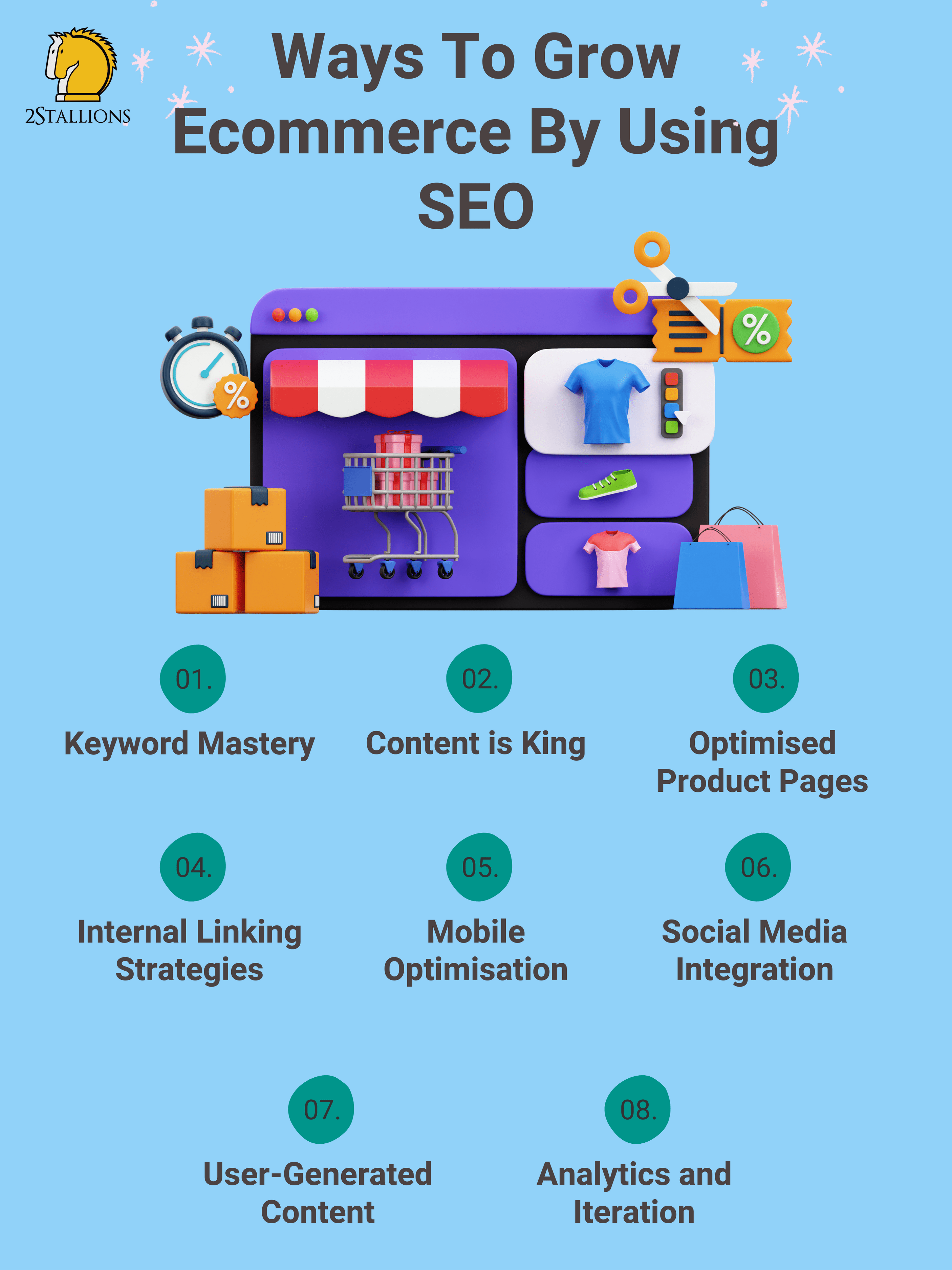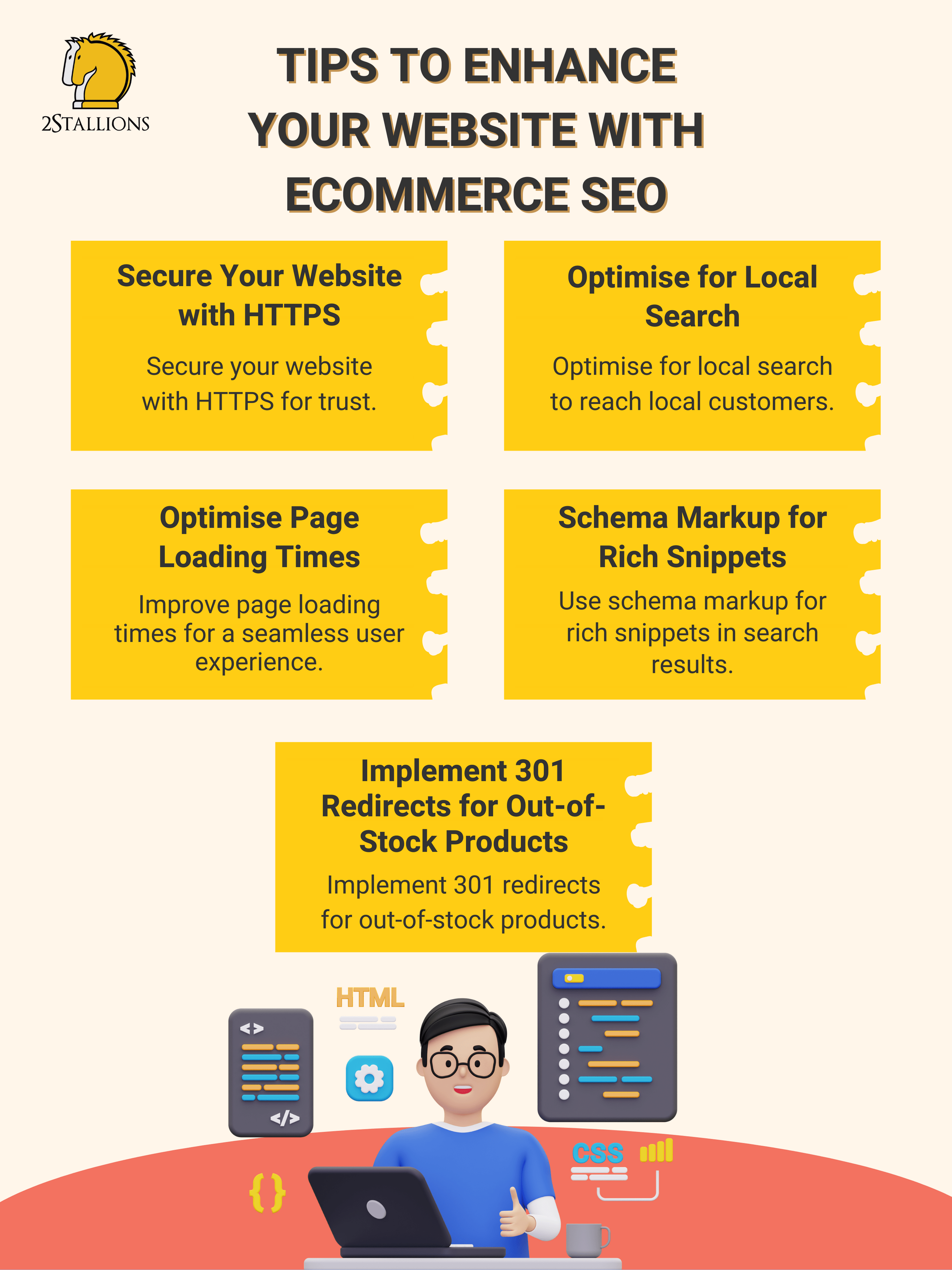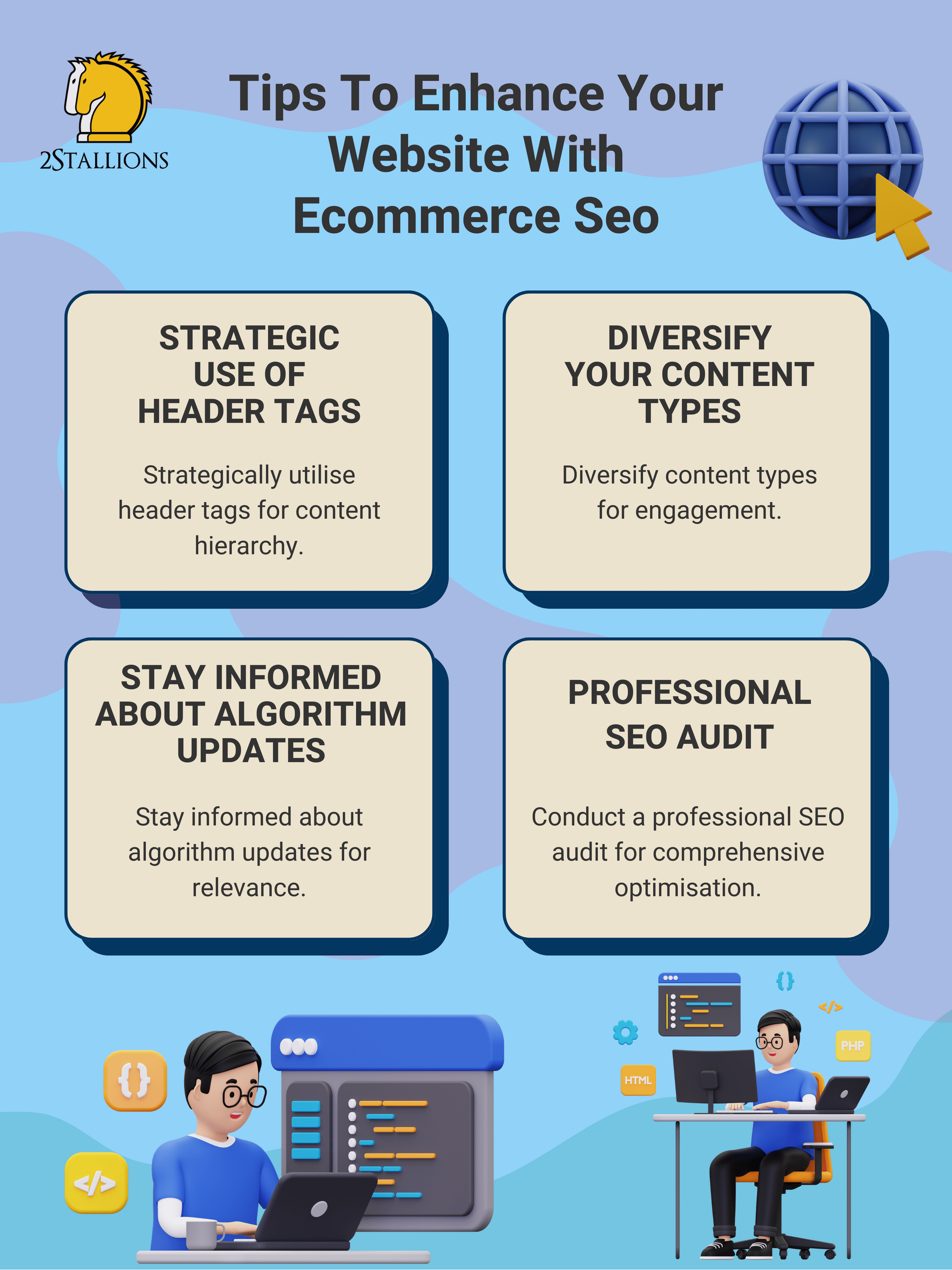SHARE

In the vast realm of online commerce, where the digital landscape is as expansive as the opportunities it holds, mastering the art of SEO emerges as the linchpin for unlocking unprecedented success and establishing your eCommerce store as a formidable player. It’s not merely a strategy, it’s the cornerstone upon which the architecture of your digital empire is built.

Ways To Grow eCommerce by Using SEO
In eCommerce, where digital storefronts abound, the key to thriving is not just survival— it’s growth. Leveraging the power of SEO becomes your roadmap to success. From attracting a surge of traffic to orchestrating remarkable sales, optimising your eCommerce store for search engines is the catalyst that propels your business to new heights. Let’s explore the strategies to drive more traffic and translate those clicks into a sales bonanza.
[thrive_leads id=’8310′]
Keyword Mastery: The Foundation of SEO Success
Begin your eCommerce growth journey by delving deep into keyword research. Identify and integrate high-value keywords that resonate with your products and align with user search intent. You’ll enhance your online visibility and attract the right audience by strategically placing these keywords in your product descriptions, meta tags, and content.
For instance, if your eCommerce store specialises in handmade leather accessories, strategic keywords like “handmade leather wallets” or “artisan leather goods” can significantly boost your visibility among users actively seeking such products.
Content is King: Engage and Inform Your Audience
Craft compelling, informative content that showcases your products and provides value to your audience. Develop blog posts, guides, and product descriptions seamlessly incorporating relevant keywords. This improves your SEO and positions your eCommerce store as an authoritative source within your niche, fostering customer trust.
Imagine you run a skincare eCommerce store. Craft engaging content around topics like “The Science of Healthy Skin” or “Choosing the Right Skincare Routine.” Seamlessly integrate keywords such as “natural skincare products” or “anti-ageing solutions” to educate your audience and enhance your SEO.
Optimised Product Pages: The Path to Conversion
Optimise your product pages for both search engines and users. Ensure clear, concise product descriptions that highlight key features and benefits. Implement SEO-friendly URLs, and remember to incorporate high-quality images with descriptive alt text. A well-optimised product page boosts your SEO and enhances the overall shopping experience, increasing the likelihood of conversions.
Consider a scenario where your eCommerce store offers eco-friendly home decor. Optimise product pages by incorporating keywords like “sustainable home accessories” and ensure clear, concise descriptions. Include captivating images with alt text, such as “recycled glass vase,” to attract customers and boost your SEO ranking.
Internal Linking Strategies: Guiding the Customer Journey
Harness the power of internal links to guide visitors through your eCommerce store seamlessly. Strategically link related products, categories, and relevant content within your site. This enhances user navigation and strengthens your website’s internal structure, signalling to search engines the interconnected relevance of your content.
Suppose your eCommerce store features a diverse range of tech gadgets. Utilise internal links strategically by connecting related products, like a blog post on “Top 10 Tech Innovations”, to specific product pages. This not only aids user navigation but also strengthens the thematic relevance of your content in the eyes of search engines.
Mobile Optimisation: Catering to On-the-Go Shoppers
In an era dominated by mobile users, ensure your eCommerce site is optimised for various devices. Google prioritises mobile-friendly websites in its rankings, making mobile optimisation crucial for SEO success. Imagine your eCommerce store sells athleisure wear. Optimise your site for mobile users with a responsive design. By doing so, you not only enhance the mobile shopping experience but also improve your SEO standing, as Google prioritises mobile-friendly sites.
Social Media Integration: Amplifying Your Reach
Integrate your SEO strategy with a robust social media presence. Share your product pages, blog posts, and promotions across platforms like Instagram, Facebook, and X (formerly known as Twitter). Social signals play a role in SEO, and a solid social media presence can drive additional traffic to your eCommerce store. Leverage the power of social media to amplify your reach and engage with your audience. Suppose you run a jewellery eCommerce store. Leverage social media platforms to share stunning images of your products, along with engaging captions—Utilise hashtags like #HandcraftedJewelry or #ElegantAccessories to broaden your reach.
User-Generated Content: Building Trust and SEO Credibility
Encourage customers to leave reviews, comments, and testimonials. User-generated content (UGC) builds trust with potential customers and provides fresh, keyword-rich content that search engines love. Positive reviews serve as social proof, influencing both SEO and the decision-making process of potential buyers. For instance, if your eCommerce store focuses on fitness equipment, a user posting a review like “Love my new home gym setup from [Your Store Name]” builds trust and generates fresh, keyword-rich content that search engines favour.
Analytics and Iteration: Data-Driven Growth
Regularly monitor your eCommerce site’s analytics to gain insights into user behaviour, keyword performance, and traffic sources. Use this data to iterate and refine your SEO strategy continually. By staying data-driven, you can adapt to changing trends, capitalise on successful tactics, and ensure sustained growth for your online store. Suppose your eCommerce store specialises in gourmet foods. Regularly analyse analytics to understand customer behaviour. If data indicates a surge in searches for “organic snacks,” consider optimising your content around this trend. Iterating based on data ensures your SEO strategy aligns with current market demands, driving sustained growth.

Tips To Enhance Your Website With Ecommerce Seo
Achieving sustained growth requires more than just a functional website. It demands a meticulous and strategic approach, with SEO as the linchpin of this digital evolution. As your online store endeavours to navigate the intricacies of the digital landscape, implementing advanced SEO techniques becomes advantageous and pivotal to staying ahead of the competition.
Secure Your Website with HTTPS
Ensure your website is secure by using HTTPS. Apart from securing user data, Google considers HTTPS as a ranking factor. A fast website boosts your SEO and instils confidence in visitors, encouraging them to explore and make purchases.
Optimise for Local Search
Optimise for local search if your eCommerce business has a physical presence or serves specific geographic areas. Include location-based keywords in your content, meta tags, and product descriptions. Register your business on Google My Business to appear in local searches, increasing visibility among potential customers in your vicinity.
Optimise Page Loading Times
A slow-loading website can drive visitors away and negatively impact your SEO. Optimise your website’s speed by compressing images, leveraging browser caching, and minimising unnecessary scripts. A fast and responsive site improves user experience and receives favourable treatment from search engines.
Schema Markup for Rich Snippets
Implement schema markup to provide search engines with additional information about your products. This can result in rich snippets appearing in search results, offering users more details directly on the results page. Rich snippets not only attract attention but also enhance the perceived credibility of your eCommerce site.
Implement 301 Redirects for Out-of-Stock Products
Implement 301 redirects to guide users and search engines to relevant alternatives when products go out of stock. This ensures a seamless experience for visitors and prevents them from encountering dead-end pages. It also preserves the SEO value of the original product page, redirecting it to a similar or relevant item.

Strategic Use of Header Tags
Utilise header tags (H1, H2, H3, etc.) to structure your content hierarchically. Search engines use these tags to understand the hierarchy and importance of your content. Place relevant keywords in header tags to signal the main topics of your pages, contributing to improved SEO.
Diversify Your Content Types
Beyond traditional product pages, diversify your content types. Include videos, infographics, and user guides that complement your products. Search engines appreciate varied content, and diverse formats can attract a broader audience. This diversity not only enhances SEO but also enriches the overall user experience.
Stay Informed About Algorithm Updates
Search engine algorithms evolve, impacting how websites are ranked. Stay informed about updates from major search engines, notably Google. Adapt your SEO strategy to align with the latest ranking factors and ensure your eCommerce site remains in good standing.
Professional SEO Audit
Consider conducting a professional SEO audit periodically. This involves a comprehensive review of your website’s SEO health, identifying areas for improvement. An audit can uncover technical issues, assess keyword effectiveness, and provide actionable insights to refine your eCommerce SEO strategy for sustained growth.
Final Thoughts: SEO Can Supercharge Your eCommerce
SEO is essential for eCommerce stores looking to drive more website traffic and sales. By understanding the importance of SEO, conducting keyword research, and optimising your website’s on-page and technical SEO, you’ll have a solid foundation for success.
Remember that SEO is an ongoing process, and you should regularly monitor and update your website’s optimisation to stay ahead of the curve. Additionally, SEO is a complex tool. To maximise your optimisation, consider calling in some expert help to ensure you get the most out of your SEO efforts.
Thrive in the Digital Competition With the Help of Expert in SEO Agency in Singapore. Gain skyrocketing traffic, maximise ROAS and be on top of your competitors. Head over to our third-party marketplace, ecommerce website design, and social ecommerce article to learn more about how we can help you grow your business! Let us help you achieve your digital marketing goal!
Originally published: 12 June 2023
Updated: 7 December 2023
Frequently Asked Questions about SEO for eCommerce
How to Increase eCommerce Sales with SEO?
To boost eCommerce sales through SEO, consider these strategies:
- Keyword Optimisation: Research and incorporate relevant keywords in product descriptions, meta tags, and URLs.
- Optimised Product Pages: Ensure clear, compelling product descriptions, high-quality images, and seamless navigation for a positive user experience.
- Mobile Optimisation: Prioritise mobile-friendliness to cater to the growing number of users shopping on smartphones.
- Internal Linking: Guide users through your site with strategic internal links, leading them to related products or categories.
- User Reviews and Ratings: Encourage customer reviews to build trust and provide fresh, SEO-friendly content.
How Can SEO Increase Traffic to Your Online Content?
SEO can significantly enhance online content traffic:
- Keyword Research: Identify high-impact keywords and integrate them naturally into your content.
- Quality Content: Create informative, engaging content that answers user queries and adds value.
- Backlinking: Build quality backlinks from reputable sites to increase your content’s authority.
- Meta Tags and Descriptions: Craft compelling meta tags and descriptions to entice users to click.
- Regular Updates: Keep content fresh and relevant to maintain search engine interest and rankings.
How Can I Drive More Traffic to My Online Store?
To drive traffic to your online store, implement these SEO-centric strategies:
- Social Media Promotion: Leverage social platforms to showcase products and interact with your audience.
- Content Marketing: Produce shareable content such as blog posts, videos, or infographics to attract a broader audience.
- Email Marketing: Utilise email campaigns to keep customers informed about promotions, new products, or discounts.
- Paid Advertising: Consider paid advertising campaigns, like Google Ads, to increase visibility.
- Local SEO Optimisation: Optimise your store for local searches, especially if you have a physical presence.
How does SEO attract customers?
SEO attracts customers by optimising your website to appear prominently in search engine results, ensuring visibility when users search for relevant products or services. By targeting specific keywords, enhancing user experience, and establishing credibility through high-quality content, SEO increases website traffic and attracts a targeted audience genuinely interested in what your business offers.
Whether through improved local search rankings, mobile optimisations, or social media integration, SEO is a cost-effective and continuous strategy to drive organic traffic, build trust, and foster lasting connections with potential customers in the competitive online landscape.





